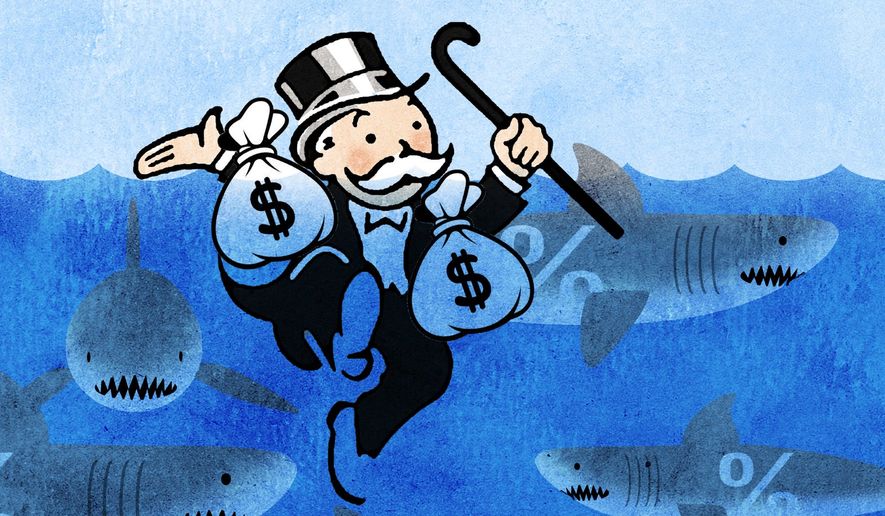OPINION:
The battle over wealth taxes is back. On March 1, Sen. Elizabeth Warren, Massachusetts Democrat, introduced legislation for a federal wealth tax — 2% for holdings over $50 million and 3% for holdings over $1 billion.
The proposal is a holdover from her failed presidential campaign (Sen. Bernie Sanders’, too), but it’s popular among some progressive economists — and a lot of voters. Folks on both sides of the political aisle are eyeing her idea approvingly, what with the growing wealth of the super rich in the last year and a government in need of money to fund a huge pandemic relief package.
But the case for wealth taxes is quite thin. In fact, if Ms. Warren gets her way, it won’t just be the rich who pay the price.
Wealth taxes are broadly popular because there’s an intuitive case that makes them sound like economic justice. The intuitive view is that they’re a way for the government to skim the top off of hoarded resources in order to pay for projects that’ll help most people. Amazon tycoon Jeff Bezos is often used as an example of a billionaire who could afford to lose a few bucks in order to help everyone out.
In fact, social media is full of viral posts pointing out that Mr. Bezos couldn’t possibly spend his entire net worth, even in a lifetime of Wall Street shenanigans. To people of this persuasion, it seems pointless for him to have that much money. No one would be worse off if the government took some.
But such views are based on a faulty concept of wealth. The viral posts about Jeff Bezos’ unspendable money rely on an idea of wealth as merely deferred consumption, like a savings account. But Mr. Bezos’ net worth is mostly his stake in Amazon. It’s not a huge bank account full of cash, or a stockpile of consumer goods like canned food. It’s his claim on trucks, warehouses and a really productive company structure.
Of course, that’s not the way it’s popular to perceive massive wealth — it’s much easier to view it as cash we can grab. But thinking that way is a problem for a couple of big reasons. First, it ignores how the wealth is constituted and gives us the wrong idea about how much of it we can nab.
Productive assets like Mr. Bezos’ can’t be transformed into public goods without destroying a lot of their value. We can’t just take a nice dollar figure of anyone’s wealth and turn it into the same dollar figure of public spending. Selling off parts of a productive company to pay a wealth tax will make those assets of lower value. Sometimes that won’t matter much, but, for very productive firms like Apple, this could cause major social losses.
The second problem of viewing wealth as cash is that it makes us think we can loot the rich without harming anyone else. Consider, again, Jeff Bezos’ stake in Amazon. He has a lot of the value created by his stake in the company, but not all of it — not by a long shot. Plenty of it accrues to Amazon employees as wages and to Amazon customers as consumer surplus. So, then, cutting into productive assets with a wealth tax means cutting into the income of more people than just capital owners. A lot of regular folks would feel it, too.
Even putting aside the feelings-based argument for a wealth tax, the technocratic case isn’t a very good one either. The most popular version in the progressive policy world is mostly a case against power. The super wealthy, these folks argue, have too much political power and are thus able to influence politics in a way that causes market concentration — artificially increasing the returns to capital and leading to a feedback loop where the rich keep getting richer. A wealth tax, policy folks like Ms. Warren insist, is a way to interrupt that cycle.
Interestingly, even if you think this progressive technocratic narrative of political economy is basically true, a wealth tax isn’t a particularly useful response. Political spending by the ultra rich is such a small portion of their wealth that it wouldn’t be much affected even by a much larger wealth tax than Ms. Warren’s. More importantly, a wealth tax would result in the opposite of what they say they want: The rich would be incentivized to spend their income on politics instead of investing in assets!
No case for wealth taxes is really a good one, but it’s hard to convince people of that. It sounds just, and it has some policy backing. Unfortunately, all of it is based on falsehood and will ultimately amount to nothing that’ll help people in the way they hope. Even if the rich really do have too much power and really don’t pay enough taxes, wealth taxes certainly aren’t the way to change that.
• Isaac LaGrand is a Michigan-based Young Voices contributor writing on economics. Follow him on Twitter @AnIsaacLaGrand.




Please read our comment policy before commenting.